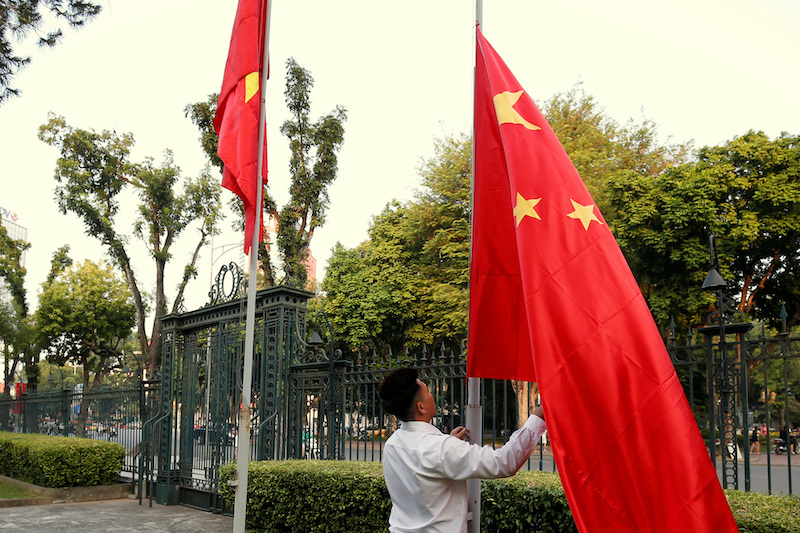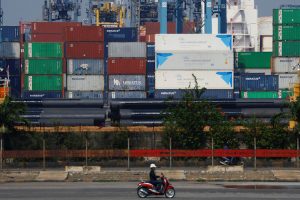Chinese President Xi Jinping started an official visit to Vietnam on Tuesday to bolster ties with his communist neighbours.
Xi’s visit comes just three months after US President Joe Biden travelled to Hanoi, as the world’s top powers vie for influence in the Southeast Asian nation.
Despite their close ties on the economic front, Beijing and Hanoi have been at odds over boundaries in the South China Sea and the two countries have a millennia-long history of conflict.
ALSO SEE: COP Battle Over ‘Weak’ Draft, Row Over Ending Fossil Fuels
Making his first trip to Vietnam in six years, Xi said the countries would build a community with a “shared future” during a meeting with Vietnam’s Communist party leader Nguyen Phu Trong, Chinese state broadcaster CCTV said.
The countries’ diplomats have debated the term for months, following Hanoi’s initial reluctance to use it, say officials and diplomats.
The Chinese phrase literally means “common destiny”, but its translation in English and Vietnamese is “common future,” which may be seen as less demanding and is expected to figure in a joint statement set to be adopted during Xi’s visit.
“One declaration, many translations,” said a diplomat based in the Vietnamese capital, commenting on the interpretation of the term.
In a statement, Vietnam said the two sides would “work out directions, tasks and measures to consolidate and further develop the Vietnam-China comprehensive strategic partnership”.
‘Mistrust of China runs deep’
However, the upgrade in ties would just be symbolic, said Le Hong Hiep, a specialist in Vietnamese strategic and political issues at Singapore’s Iseas–Yusof Ishak Institute.
“Vietnam’s mistrust of China runs deep, and from the Vietnamese people’s viewpoint, there is little to no ‘shared destiny’ between the two countries, as long as China continues to claim most of the South China Sea,” he said.
Beyond taking ties to a level Beijing may see as being above those with the United States, upgraded status would come with the signing of “dozens of co-operation documents,” Vietnam’s state newspaper Tuoi Tre quoted China’s ambassador Xiong Bo as saying before Xi’s visit.
Deals are expected to include Chinese investments to upgrade rail links between the neighbours, which would include grants, though the volume and terms of possible loans are not clear.
Boosting transport links would allow Vietnam to export more to China, especially farm products, while Beijing wants to further integrate the country’s north with its southern supply chain networks.
Chinese firms have moved some operations to Vietnam quicker this year than before the Covid-19 pandemic, looking to be closer to Western clients there, lower risks from US-China trade tension and cut exposure to China’s weakened economy.
Stronger rail networks would speed import of components from China for assembly in Vietnam, effectively expanding China’s Belt and Road Initiative (BRI).
Xi called for faster co-operation on building infrastructure, in an opinion piece run in the newspaper of the Vietnamese Communist Party ahead of his visit.
China has pushed to include Vietnam in its Digital Silk Road, which may entail investments for new undersea optical fibre cables, the 5G network and other telecoms infrastructure.
Although the Hanoi metro is Vietnam’s only project to have received BRI loans, it has not been labelled as such in a country where anti-Chinese sentiment is still widespread enough that such moves could be viewed as getting too close to Beijing.
Xi urged wider co-operation on security, connectivity, green energy and critical minerals, in a reference to the rare earths, of which China is the world’s leading refiner while Vietnam has the second largest estimated reserves after its neighbour.
- Reuters with additional editing by Jim Pollard
ALSO SEE:
Xi’s Vietnam Visit Set to See Rail, Tech Cooperation Deals
Rare Earth Magnet Firms Plan Vietnam Plants as China Hedge
Chinese Energy Storage, Battery Firms Plan $1bn Vietnam Plants
Vietnam Power Cuts Hit Samsung, Foxconn, Canon Factory Hubs
Apple MacBook Manufacturer Quanta to Build Vietnam Factory
Vietnam’s Economy Hits Fastest Growth Rate Since 1997
Vietnam, India Ramp up US Exports as China Share Falls – Caixin
























